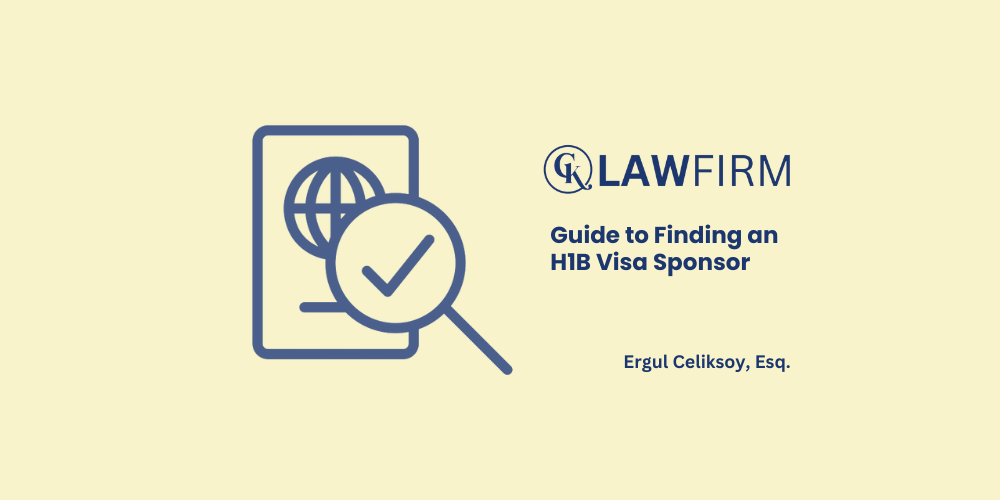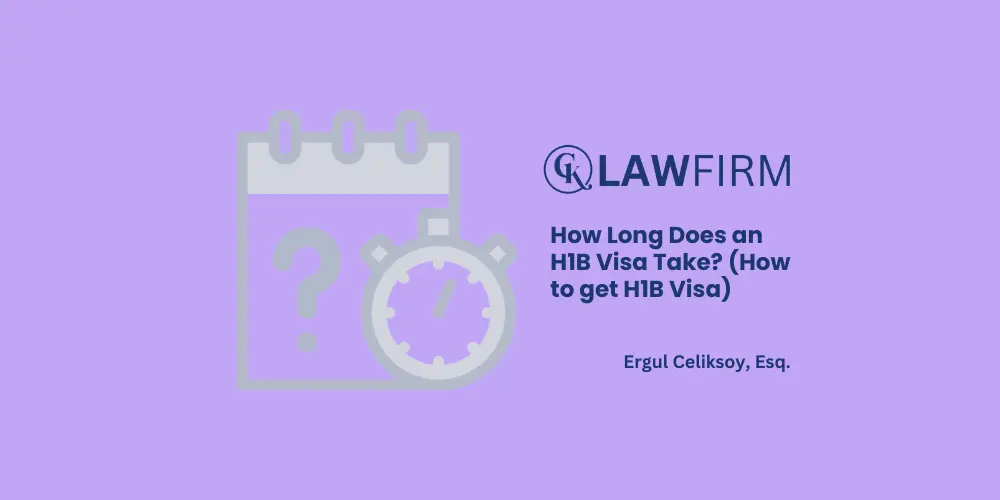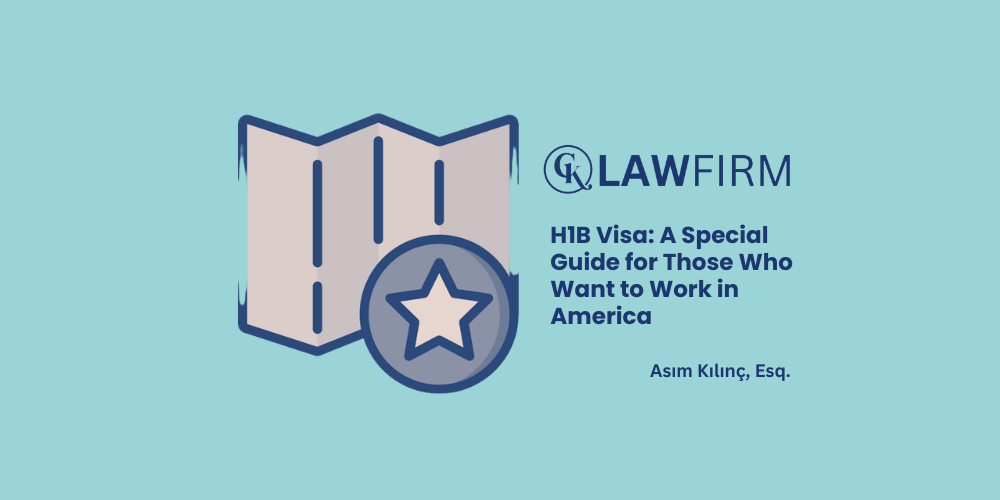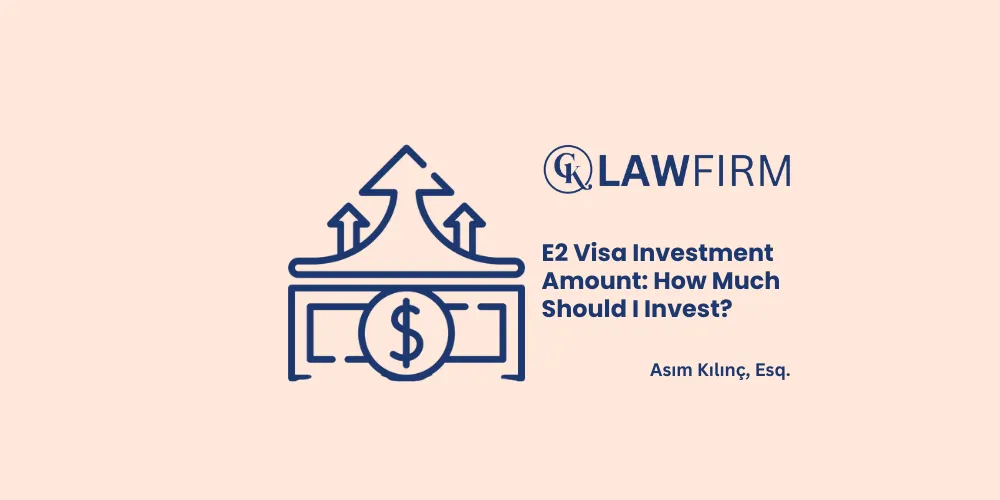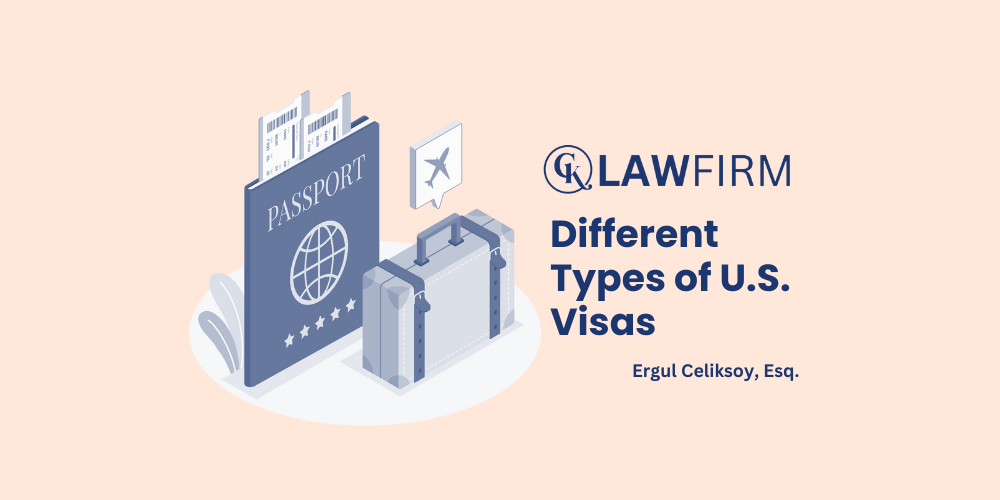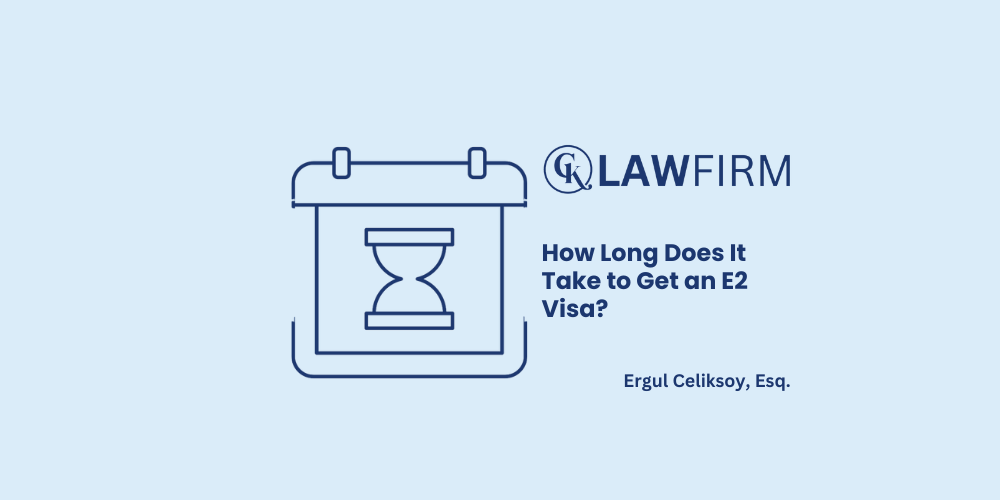Schedule an Appointment with Our Attorneys Now
By Ergul Celiksoy, Immigration Attorney at CK Law Firm
The H1B visa is one of the pathways for foreign professionals dreaming of building a career in the United States. However, the most critical aspect of obtaining this visa is securing sponsorship from a U.S.-based company. In this guide, I will cover key topics related to finding an H1B visa sponsor. Here’s what you’ll find in this article:
- What is the H-1B Visa, and Why is Sponsorship Important?
- How to Find Companies that Offer H-1B Sponsorship
- Key Considerations When Searching for a Sponsor
- Strategies for Securing an H-1B Sponsor
- Costs Covered by H-1B Visa Sponsors
If you have additional questions about the H-1B visa, feel free to share them in the comments section of this blog or reach out via the CK Law Firm official website. For detailed information or consultancy services, you can also connect with me directly on LinkedIn.
What is the H-1B Visa, and Why is Sponsorship Important?
The H-1B visa is designed for professionals seeking to work in specialized occupations in the United States. To apply for this visa, you must have a U.S.-based company willing to sponsor your application. This makes finding an H-1B visa sponsor a critical step, as you cannot proceed with the application without securing sponsorship.
Responsibilities of Sponsor Companies
Sponsor companies have various responsibilities in the H-1B visa process. Here are the primary duties of H-1B visa sponsors:
- LCA (Labor Condition Application): This is a submission to the U.S. Department of Labor, certifying that the job will not harm the U.S. labor market and offers fair conditions for the employee.
- Filing Form I-129: This form is a fundamental component of the H-1B visa application. It officially declares the employer’s request for an H-1B visa on behalf of the employee. Submitted to USCIS (U.S. Citizenship and Immigration Services), the form outlines the details of the employment relationship between the employer and the employee.
- Payment of Fees: All official fees related to the H-1B application must be covered by the employer.
Sponsor companies bear both financial and administrative responsibilities, making them the cornerstone of the H-1B visa application process. For this reason, professionals seeking an H-1B visa sponsor should carefully evaluate potential employers during this process.
How to Find Companies Offering H-1B Sponsorship
Finding a sponsor company for an H-1B visa can be a time-consuming process, but with the right strategy, you can streamline your efforts and save valuable time. Here are some suggestions to help you identify companies suitable for sponsorship:
1. Use Databases of Companies Offering H-1B Sponsorship
Leverage platforms that list companies with a history of filing H-1B visa applications. These tools provide valuable insights into sponsorship opportunities:
- MyVisaJobs: A comprehensive database displaying past H-1B applications and approval rates.
- H1BGrader: A platform that analyzes sponsorship histories and the performance of companies.
2. Utilize Social Networks
Platforms like LinkedIn allow you to directly connect with companies that offer H-1B sponsorship. Social networks can be a powerful tool for establishing direct contact with potential sponsors.
3. Apply to Large Technology Companies
Tech giants like Amazon, Google, and Microsoft hire thousands of professionals annually through the H-1B visa program. By keeping track of available positions that match your expertise, you can secure a job and obtain a work permit in the U.S. Regularly monitor career opportunities to connect with these companies and find roles aligned with your qualifications.
4. Academic Institutions
Many universities and research centers in the U.S. offer H-1B sponsorship. If you have academic expertise, consider reaching out to such institutions. This can provide an opportunity to advance your academic career within a globally recognized organization.
What to Consider When Searching for an H-1B Sponsor
Finding a sponsor company can sometimes be challenging for applicants. Those seeking H-1B visa sponsorship should pay close attention to certain factors to ensure a smoother process. Before starting your application with an employer, have a detailed discussion to secure your position. Key considerations include:
- Company’s H-1B History: Opt for companies that have previously filed H1B visa applications. Working with an employer familiar with the process can significantly ease your experience.
- Job Compatibility: Ensure the position aligns with your area of expertise. This increases the likelihood of your application being approved and helps avoid surprises once you start working in the U.S.
- Transparency: Confirm that the employer covers all necessary fees and follows official procedures accurately.
By focusing on these factors, those seeking H1B sponsorship can better navigate the process and improve their chances of visa approval.
Strategies for Securing an H-1B Sponsor
To increase your chances of finding a sponsor, it’s essential to adopt the right strategies. A well-planned approach can simplify what might seem like a complex process. Finding a sponsor becomes much easier when you follow these steps:
- Expand Your Network: Actively participate in professional platforms, particularly those related to your field of expertise. This allows employers to notice your skills and professional achievements.
- Explore Multiple Platforms: Don’t limit yourself to just one platform for sharing your experience and knowledge. Try different platforms to strengthen your connections and increase visibility.
- Present Yourself Effectively: Ensure your resume highlights your qualifications, education, experience, and skills clearly and professionally.
- Be Patient: The process of finding a sponsor may take time. Stay confident, persistent, and patient throughout your journey.
Following these strategies will not only help you find the right sponsor but also increase your chances of securing an H-1B visa successfully.
Costs Covered by H-1B Visa Sponsors
Sponsor companies are responsible for covering certain expenses associated with the H-1B visa application. The primary costs that sponsors must pay include:
- Application Fee: $460
- Anti-Fraud Fee: $500
- Education and Workforce Fee: Ranges from $750 to $1,500 depending on the size of the employer.
- Premium Processing Fee (Optional): $2,500
These payments are the responsibility of the sponsor company and are part of their official obligations. For more detailed information, you can check out our article, “How Much Does H-1B Visa Cost? (Detailed Pricing)“.
In this guide, we discussed what the H1B visa is and how you can find a sponsor. If you have any questions, feel free to leave a comment on this blog or reach out to us through the official CK Law Firm website. For personalized inquiries or consultancy services, you can also connect with me on LinkedIn.
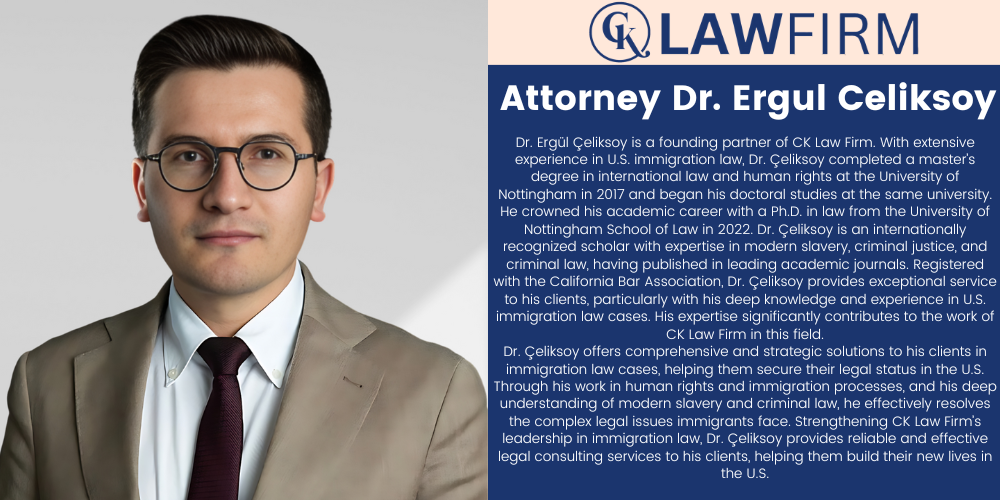
By Ergul Celiksoy, Immigration Attorney at CK Law Firm
The H1-B visa is a type of visa that allows foreign professionals to obtain a temporary work permit in the US. With the H1-B visa, professionals get the chance to work and reside in the US for 3 years. They also have the chance to take their families with them. In this article, I am addressing the following topics with the question of how to get H1B visa:
- H1-B Visa Processing Times: How Long Should You Wait?
- 2025 H1-B Visa Application Period: When and How to Apply?
- H1-B Application Process: Basic Steps
- USCIS’ H1-B Visa Evaluation Criteria: What You Need to Know
If you have any questions beyond these topics, you can reach us in the comments of this blog or on the CK Law Firm Official Website. You can also reach me on LinkedIn for your private inquiries and consultancy services.
H1-B Visa Processing Times: How Long Should You Wait?
How many days does it take to get an H1B visa? This can vary depending on the current workload of USCIS (US Citizenship and Immigration Services) and the complexity of the application. But generally, applicants should be prepared for a processing time that can take several months. Here are some key points to better understand this process:
Standard Processing Time
Usually H1B visa applications are processed within 3 to 6 months. However, complete and accurate preparation of the application may affect this time. A timely and accurate Labor Condition Application (LCA) submitted by your employer can also shorten the processing time.
Premium Processing Option
For those who want a faster result, there is a premium processing option available for an additional fee. With this service, applications are processed within 15 working days. This option can be ideal, especially for applicants close to their start date.
Other Factors Affecting the Processing Time
In some cases, processing times may vary. This can be due to the volume of applications, seasonal fluctuations, and federal holidays. In addition, USCIS may request additional information due to missing documents or information, which may extend your process.
Tips to Optimize Processing Time
Here are tips to make the processing time more effective:
- Apply Early: Be prepared for the H1B visa application, which opens in early April every year.
- Prepare Your Documents in Advance: Gather and organize all the necessary documents.
- Use the Right Forms: Make sure that the Form I-129 (Application for U.S. Nonimmigrant Work Authorization) and the current LCA (Labor Condition Application) required for the H1B visa are used correctly.
2025 H1-B Visa Application Period: When and How to Apply?
The timing and requirements of the process for the US H1B visa application are determined and announced by USCIS at certain periods each year. Here is what you need to know about 2025 H1B visa application dates:
- H1B applications usually start in the first week of April each year. However, the electronic registration process usually starts in February or March. The exact dates for 2025 have not yet been announced. Therefore, it is very important to follow USCIS’ announcements regularly.
- Starting in 2021, the application process for the H1B visa is governed by a system that requires candidates to register electronically. This process involves registering the names of the candidates and completing the selection process. Selected candidates receive an invitation to submit their formal application. This system is designed to make the process more efficient and fair.

H1-B Application Process: Basic Steps
The H1B visa application is a complex process that follows specific steps. Candidates need to be careful and attentive at every stage for successful completion. Here are the basic steps of the application process for US H1B visa and the documents required for H1B visa:
Step 1: Agreement with the Employer
The H1B visa appointment begins when an employer in the US commits to hiring a foreign employee for a specialized position. This position must be in a specialized field of knowledge that requires theoretical and practical application. The employer must make a job offer to the candidate and prepare a job offer letter detailing that offer.
Step 2: Preparation and Approval of the Labor Condition Application (LCA)
As the next step in the America H1B visa application process, the employer must submit a Labor Condition Application (LCA) to the US Department of Labor (DOL). The LCA certifies that the employer complies with certain working conditions and wage standards. Approval of the LCA is an important part of the visa application and must be approved before continuing with the application process.
Step 3: Completing and Submitting Form I-129
Once the LCA is approved, the employer files Form I-129, Application for a US Non-Temporary Work Visa, with USCIS. This form forms the basis of the application and contains detailed information regarding the employer’s requirements for employing the candidate. Form I-129 must be carefully completed by the employer and submitted with all required supporting documents.
Step 4: USCIS Review and Approval
After USCIS evaluates the Form I-129 and other supporting documents, it either approves the application or may request additional information (RFE). The request for additional information may prolong the application process. Therefore, it is important for the employer to prepare the application completely and accurately from the beginning. The approval process may vary depending on the volume of applications and the current workload.
Step 5: Visa Application and Entry Permit
Once Form I-129 is approved, Turkish employees may need to file an individual H1B visa application at a U.S. consulate. This process typically includes an interview, the collection of biometric data, and the payment of required visa fees. After the visa is approved, the Turkish employee can enter the United States.
These steps form the foundation of the H1B visa application process. Each step is critical to ensuring the application is successfully completed. For more details and updates, it is highly recommended to regularly visit the official website of USCIS. Additionally, should any challenges arise at any stage of the process, you can contact us through the CK Law Firm Website for professional legal assistance.
USCIS H1-B Visa Evaluation Criteria: What You Need to Know
The H1B visa is a type of visa that allows Turkish professionals to work in the United States in occupations requiring specialized skills and knowledge. USCIS evaluates applications for this visa based on specific criteria. Here are the H1B visa requirements and key evaluation factors:
1. Occupational Qualifications
For an H1B visa application, the position must fall under the category of a “specialty occupation“. This typically includes roles requiring a high level of theoretical and practical expertise. Fields such as engineering, science, law, technology, mathematics, and finance are common examples. It is the employer’s responsibility to demonstrate that the position meets these criteria.
2. Educational Requirements
Foreign professionals applying for an H1B visa are typically required to hold at least a bachelor’s degree or possess equivalent education or experience. The candidate’s educational background should be directly related to the specialized knowledge or expertise required for the position they are applying for.
3. Employer’s Needs
USCIS evaluates whether the employer genuinely requires an H1B visa employee for the position. The employer must demonstrate that the role is so specialized that it cannot be filled by the existing workforce and that the foreign worker’s skills and knowledge are critical to the business.
4. Salary and Working Conditions
For H1B visa applications, employers must show that the offered salary aligns with the prevailing wage or industry standards in the region. Additionally, the working conditions for the foreign employee must be equal to or better than those of American workers in similar roles.
5. Labor Condition Application (LCA)
As part of the application, the employer must submit an approved LCA. This document certifies to the U.S. Department of Labor (DOL) that the foreign worker’s wage will not fall below the region’s prevailing wage and that the working conditions will not create unfair competition in the job market.
These evaluation criteria are designed to ensure that H1B visa applications are reviewed objectively and fairly. Paying close attention to these criteria during the preparation and application process can significantly improve the chances of success. For more information, feel free to contact us through the CK Law Firm Website. Additionally, if you have questions beyond “How long does it take to get an H1B visa?” or need assistance with other matters, you can also reach out to me via LinkedIn.
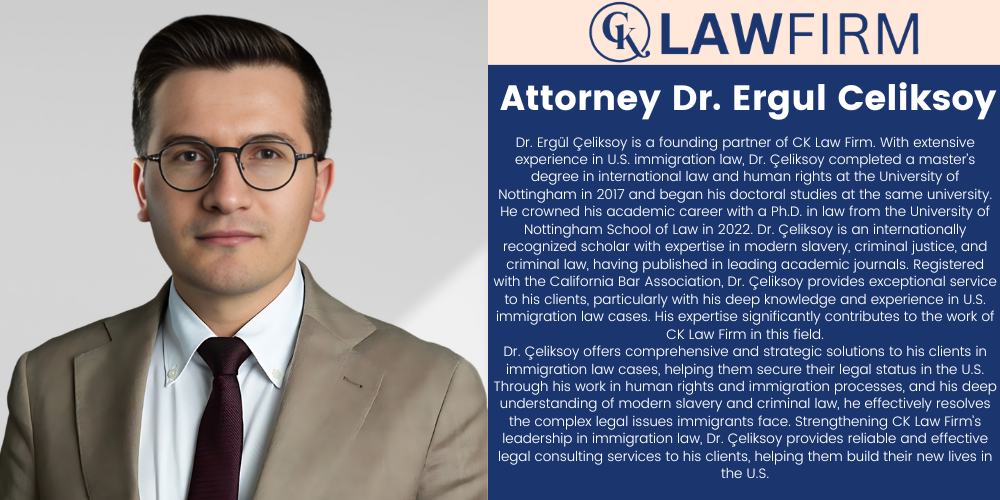
Asım Kılınç, Immigration Attorney, CK Law Firm
Many foreign professionals with the goal of working in the US can achieve their work visa goal with the H1B visa. The H1B visa allows professionals who specialize in fields such as science, technology, engineering and mathematics to start work after being offered jobs by US employers. In this guide, I answer the following questions about the H1B visa:
- H-1B Visa Occupations: Which Sectors Can You Apply?
- H-1B Visa Application Requirements: Who is Eligible?
- Documents Required for H-1B Visa
- H-1B Visa Fee: Detailed Analysis
- What is the H-1B Visa Quota?
If you have any other questions about the H1B visa, please feel free to contact us in the comments section of this blog or on the CK Law Firm Immigration Lawyer Webpage. You can also contact me on LinkedIn for private inquiries and consultations.
H-1B Visa Occupations: Which Sectors Can You Apply From?
H-1B visa occupations require specialization, especially in fields such as computer science, engineering and health sciences. This visa is also suitable for people of different nationalities working in positions that require a high level of education and expertise. Some sample professions for which you can apply for an H-1B visa are as follows:
- Computer systems analysts
- Biotechnology experts
- Architect
- Engineer
- Financial and investment analysts
H-1B Visa Application Requirements: Who is Eligible?
To be eligible to apply for an H1-B visa, candidates generally need to have a bachelor’s degree in the relevant field or equivalent professional experience. Among the H1-B visa requirements, it is important for candidates to document that they have the necessary knowledge and skills for the job position they are applying for. People who have these competencies can apply for an H1-B temporary work visa.
What are the Documents Required for H-1B Visa?
We need to consider the documents required for the H-1B visa application in two separate categories. The documents that your employer, i.e. the sponsor, must provide and the documents that you, as the applicant, must provide are separate. First of all, the documents that the employer must provide are as follows:
- Approved and signed H visa request form
- A document containing the average salary of employees in similar positions in your region
- Document showing the salary paid by the employer to employees in similar positions
- Fee receipt paid to the US Department of Homeland Security (Paid by the employer)
- All offer letters explaining the terms and duration of employment
- If the employee will be working in more than one location, additional documentation listing the dates and address of the locations where the work will be performed
- Evidence that the employee has the degree required for the job, such as transcripts and diplomas.
- Translation of all documents not originally in English certified by a sworn translator
- Educational equivalency assessment for degrees from non-US universities
- Current CV
- Professional license (if required)
- Passport page with personal details and expiration date
- If the employee is in the US, the passport page showing the most recent visa stamp and documents showing the status of presence and entry and exit from the country
The documents that you, the people who will apply for the H-1B visa, should prepare are as follows:
- Passport
- Application fee receipt
- Photo
- Receipt number (can be found on form I-129)
H-1B Visa Fee: Detailed Cost Analysis
H-1B visa fees primarily include the H-1B registration fee. This registration fee is 215 dollars. The subsequent Form I-129 fee has two different pricing according to the size of the employer’s company. While this fee is 780 dollars for large companies, it is 460 dollars for small businesses.
Form I-129 is a form that employers in the United States submit to the Bureau of Citizenship and Immigration Services (USCIS) in the United States to apply for work authorization for non-immigrant workers. This form must be approved to apply for an American Temporary Work Visa.
In addition to these fees, there is also a Premium processing fee to ensure that your transaction is fast-tracked within 15 days. The fee for this process is 2,805 dollars. However, this does not speed up your consular visa process.
How to Get an H-1B Visa: Step-by-Step Application Guide
The answer to the question of how to get an H-1B visa may vary due to the fact that the process is completely personal. In this process, you must first find an employer who will offer you a job offer from your profession. Afterwards, your H-1B visa process starts with the employer registering online for you.
Once the registration is approved, your employer files a DOL (US Department of Labor) approved LCA (Labor Condition Application) and Form I-129 (Petition for Alien Worker) with USCIS (US Citizenship and Immigration Services). After all documents are submitted completely and accurately, USCIS evaluates the application and the H-1B visa allows you to start your US life.
What is an H-1B Visa Quota?
After finding answers to the questions of what is an H-1B visa, another most curious issue is the quota of the H-1B visa. As applications for H-1B visas have increased over time, a certain quota has been formed in this visa type and these applications have become received by lottery as many as the number determined in the quota. Previously, applications remained open for a long time to fill the quota, while today the quota is filled quickly.
This quota offers 85,000 positions. Of these, 65,000 are reserved for bachelor’s graduates or experienced people, while 20,000 are reserved for postgraduates or higher academic professionals.
If you would like support with your H1-B visa process, you can always contact us through the CK Law Firm Website or in the comments. You can also reach me on LinkedIn for private inquiries or consulting services.
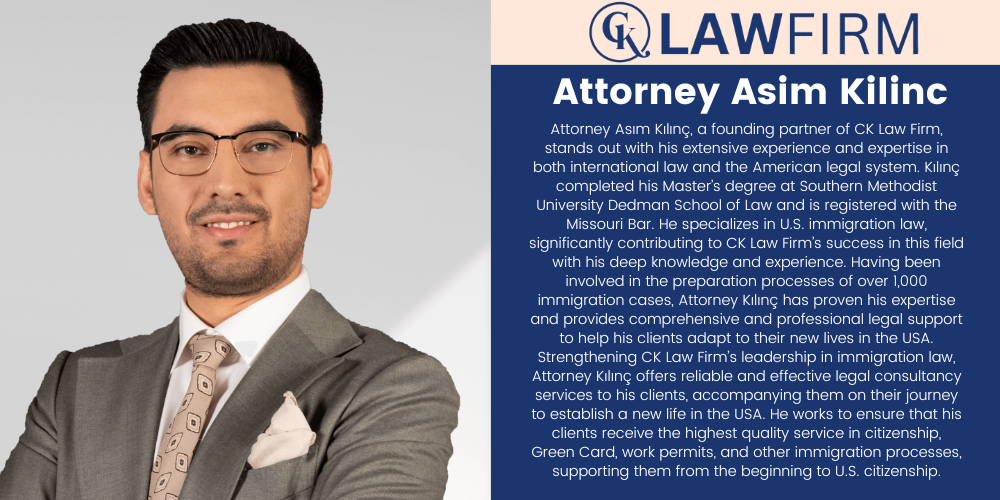
Asım Kılınç, Immigration Attorney, CK Law Firm
The E-2 visa is an exceptional opportunity for entrepreneurs, investors, and business-minded individuals who wish to establish or expand their ventures in the United States. Designed for nationals of certain treaty countries, the E-2 visa allows foreign investors to reside and work in the U.S. based on a substantial investment in a U.S. business. This blog will provide a comprehensive overview of the E-2
investment amount, visa process, investment requirements, and frequently asked questions to help you make informed decisions. Here are the topics I will cover in our blog:
- What Is the Minimum Investment for an E-2 Visa?
- Examples of E-2 Visa Investments
- E-2 Visa Requirements
- E-2 Visa Duration and Processing Time
- Transitioning from E-2 Visa to Green Card
- Frequently Asked Questions
While answering these questions, I will also address the sub-headings that are curious. However, as in every visa application, you can contact us via the official website of CK Law Firm to get support from us in E2 visa application. You can also always reach me on my LinkedIn account.
What Is the Minimum Investment for an E-2 Visa?
One of the most common questions asked by potential applicants is, “How much investment is required for a US E2 visa?” Unlike some other visa categories, the E-2 visa does not specify a fixed minimum investment amount. Instead, the investment must be considered “substantial,” which means it should be proportional to the total cost of the business. In practice, successful applications often involve investments starting from $100,000, but this can vary depending on the nature and scale of the enterprise.
The term e-1 visa minimum investment often creates confusion, but it’s important to note that the E-1 and E-2 visas serve different purposes. While the E-1 visa focuses on trade, the E-2 visa revolves around investments. Ensure you’re meeting the criteria specific to the E-2 category to maximize your chances of approval.
Examples of E-2 Visa Investments
To better understand the possibilities, let’s explore some E-2 visa investment examples:
- Franchise Businesses: Investing in well-known franchises like restaurants or fitness centers is a popular choice due to established business models.
- Startups: Launching a tech company or innovative product-based business is ideal for entrepreneurs with unique ideas.
- Existing Businesses: Purchasing an existing E2 visa business for sale is often a straightforward option, as these businesses already meet operational and financial requirements.
Each type of investment has its own set of challenges and advantages. It’s crucial to work with an experienced attorney to ensure your business plan aligns with the visa requirements.
E-2 Visa Requirements
To qualify for an E-2 investor visa, applicants must meet specific criteria. Here are the key E-2 visa requirements:
- Treaty Country Eligibility: You must be a national of a country that has an E-2 treaty with the United States. To check your eligibility, review the official list of E-2 visa countries on the USCIS website.
- Substantial Investment: The investment must be significant enough to ensure the success of the business. It should also be at risk, meaning it cannot be speculative or idle funds.
- Active Participation: You must actively manage the business or hold a position that involves essential skills. Passive investments, such as purchasing real estate for rental purposes, do not qualify.
E-2 Visa Duration and Processing Time
The E-2 visa duration depends on your country of origin but typically ranges from two to five years. The visa can be renewed indefinitely, provided you continue to meet the requirements and the business remains operational.
When it comes to the E2 visa processing time, it varies based on your location and method of application. Premium processing is available, which expedites the decision-making process to just 15 days. Without premium processing, the timeline can range from several weeks to a few months.
Transitioning from E-2 Visa to Green Card
While the E-2 visa is a non-immigrant visa, many investors inquire about converting it to permanent residency. The pathway from E-2 visa to green card typically involves other immigration routes, such as family sponsorship, employment-based visas, or the EB-5 investor visa. Each option requires careful planning, so consult an attorney to explore your long-term immigration goals.
Frequently Asked Questions
- How much investment is needed for E2? The required E2 visa investment amount varies based on the business type but generally starts around $100,000. Substantiality is determined in relation to the business’s overall cost.
- Is there a limit on E2 visa? There is no numerical limit on the number of E2 visa investment amount issued annually. However, the business must meet specific criteria to qualify.
- Can I buy property in USA on E2 visa? Yes, you can purchase property on an E-2 visa, but passive investments like rental properties do not fulfill E-2 requirements. The property should be part of an active business enterprise.
If you would like more information about the E2 visa or would like to start the application process, you can contact us through the official website of CK Law Firm. You can also always reach me on my LinkedIn account.
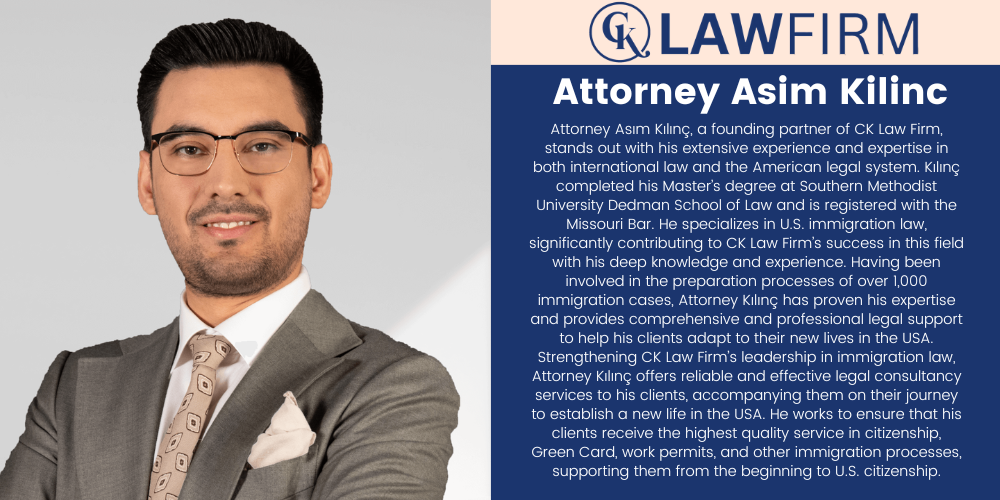
By Ergul Celiksoy, Immigration Attorney at CK Law Firm
Navigating the U.S. immigration system can be complex, especially when trying to understand the various types of visas available. Whether you are planning to visit, work, study, or live permanently in the United States, knowing which visa you need is crucial. This guide will help you understand the different types of U.S. visas, their eligibility requirements, and the application processes.
Immigrant Visas
1. Family-Sponsored Visas
- Immediate Relative Immigrant Visas (IR): Available for spouses, unmarried children under 21, and parents of U.S. citizens.
- Family Preference Immigrant Visas (F): For more distant family relationships with a U.S. citizen or specific family relationships with a lawful permanent resident.
2. Employment-Based Visas
- EB-1: For individuals with extraordinary abilities, outstanding professors and researchers, and multinational executives.
- EB-2: For professionals with advanced degrees or exceptional abilities.
- EB-3: For skilled workers, professionals, and other workers.
- EB-4: For special immigrants, including religious workers and U.S. government employees.
- EB-5: For immigrant investors in new commercial enterprises.
3. Diversity Visa Lottery (DV)
- Annually provides up to 50,000 visas to individuals from countries with low rates of immigration to the U.S.
Non-Immigrant Visas
1. Visitor Visas
- B-1: For business visitors.
- B-2: For tourists, medical treatment, and visiting family or friends.
2. Work Visas
- H-1B: For specialty occupations requiring highly specialized knowledge.
- H-2A: For temporary agricultural workers.
- H-2B: For temporary non-agricultural workers.
- L-1: For intra-company transferees.
- O-1: For individuals with extraordinary ability or achievement.
- P-1: For internationally recognized athletes or entertainers.
3. Student Visas
- F-1: For academic students.
- M-1: For vocational or non-academic students.
- J-1: For exchange visitors participating in programs promoting cultural exchange.
4. Temporary Protected Status (TPS) and Other Humanitarian Visas
- TPS: For individuals from countries experiencing ongoing armed conflict, environmental disasters, or other extraordinary conditions.
- U Visa: For victims of certain crimes who assist law enforcement.
- T Visa: For victims of human trafficking.
Special Categories
1. Fiancé(e) Visas
- K-1: For fiancés of U.S. citizens.
- K-2/K-4: For children of K-1/K-3 visa holders.
2. Religious Worker Visas
- R-1: For temporary religious workers.
3. Cultural Exchange Visas
- Q-1: For participants in international cultural exchange programs.
Conclusion
Understanding the different types of U.S. visas and their requirements is essential for a smooth immigration process. Each visa category has specific criteria and application procedures. At CK Law Firm, we are dedicated to helping you navigate this complex system and achieve your immigration goals. Contact us today for personalized legal assistance and expert guidance.
By Ergul Celiksoy, Immigration Attorney at CK Law Firm
The E2 investor visa is a remarkable pathway for entrepreneurs looking to establish or acquire a business in the United States. This visa is available to citizens of treaty countries, and provides a unique opportunity to live and work in the U.S. while managing a business. One of the key questions potential applicants ask is, “How long does it take to get an E2 visa?” In this blog, we’ll explore the timeline, eligibility criteria, and essential details about the E2 visa process. Let’s talk about the questions I will address in this article:
- What Is an E2 Visa, and Who Can Apply?
- How to Apply for an E2 Visa
- How Long Does the E2 Visa Process Take?
- Can the E2 Visa Lead to a Green Card?
- A New Beginning in America
If you are planning to get a E2 investor visa but don’t know how to apply, you can contact us on our website or in the comments section of our blog. You can also send me a message on LinkedIn for private communication.
What Is an E2 Visa, and Who Can Apply?
The E2 visa is a non-immigrant visa that allows individuals to enter the U.S. to manage an active business in which they have made a substantial investment. According to USCIS guidelines, applicants must meet the following requirements:
- Be a Citizen of a Treaty Country: Applicants must hold citizenship in a country that has a trade and investment treaty with the United States. For a full list of eligible countries, you can visit the official USCIS website.
- Make a Substantial Investment: The investment must be significant enough to ensure the success and operation of the business. While no minimum amount is specified, it should be proportionate to the type and scale of the enterprise.
- Control and Operate the Business: Applicants must play an active role in managing the business. Passive investments, such as owning shares without involvement in daily operations, do not qualify.
- Contribute to the U.S. Economy: The business must generate jobs or economic benefits for U.S. residents, proving its sustainability and contribution.
According to USCIS, the above conditions must be met in full to apply for an E2 visa. When these conditions are met, the applicant has a very high chance of realizing his/her dreams by starting a business in America. Getting support from a professional immigration attorney is very important to ensure that the process goes more smoothly.
Detailed Eligibility Criteria as Defined by USCIS
The E2 visa eligibility criteria provided by USCIS emphasize several important details:
- Lawful Source of Funds: The investment capital must be acquired through legal means, and applicants must demonstrate clear documentation of the funds’ origins.
- Real and Active Business: The enterprise must be actively operating or close to commencing operations. Investments in speculative or idle enterprises do not meet the requirements.
- Risk of Investment: The applicant’s capital must be at risk in the business. This means the investment is irrevocable and subject to potential loss.
How to Apply for an E2 Visa
There are two main pathways for applying for an E2 visa:
- Through a U.S. Consulate or Embassy:
If you are outside the U.S., you can apply at the U.S. embassy or consulate in your country. Processing times vary but typically range from 2-3 months. - Through USCIS for a Change of Status:
For those already in the U.S. on a different visa, applying for a change of status through USCIS is an option. However, this process often takes longer, around 4-6 months, depending on case loads and the completeness of the application.
How Long Does the E2 Visa Process Take?
The timeline for an E2 visa varies depending on the method of application:
- Embassy or Consulate Applications: Average processing time is 2-3 months.
- Change of Status Applications: USCIS processing can take 4-6 months or longer, depending on the volume of applications.
To avoid delays, ensure that your application is complete, well-documented, and adheres to USCIS guidelines.
Can the E2 Visa Lead to a Green Card?
While the E2 visa does not directly lead to a Green Card, it can serve as a stepping stone for permanent residency through other pathways, such as the EB-5 investor visa. This option requires a more substantial investment but provides a direct route to permanent residency.
A New Beginning in America
The E2 investor visa is an opportunity to fulfill your dreams by starting a business in America. However, the process can be complicated. Details such as E2 visa requirements, application period and business plan should be carefully studied. With the support of a professional consultancy, you can complete this process more easily and quickly.
If you need more information about the E2 visa duration or application process, you can contact us through our CK Law Firm Official Website or you can get support from me on my LinkedIn account for detailed guidance. Starting a business in America with an E2 investor visa is no longer a dream!
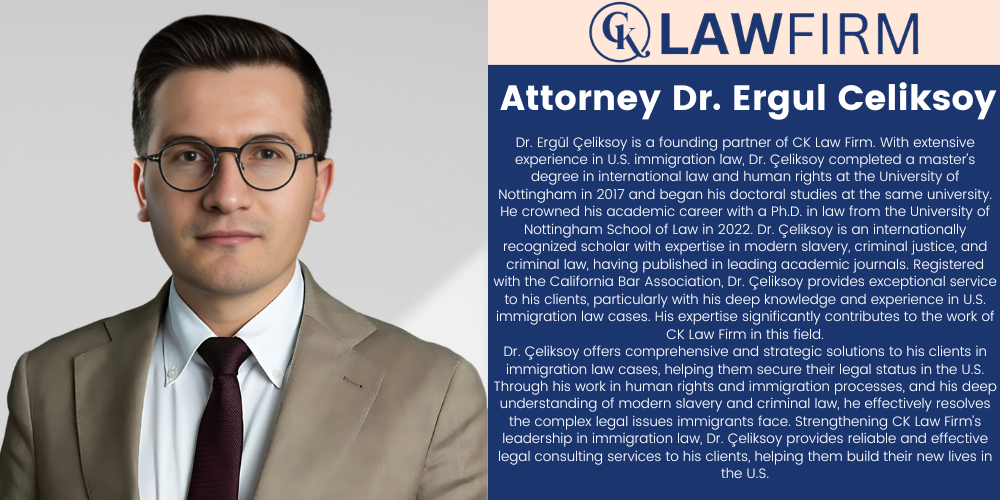
Subscribe to Our Newsletter
Subscribe to our newsletter to stay informed about the latest announcements and articles written by our attorneys on U.S. immigration processes.
Aout Us
Our experienced lawyers at CK Law Firm offer effective solutions for those who want to make new beginnings in the USA. We facilitate and accelerate your immigration process by providing consultancy on all visa types.
Our Services
Visas
Business Green Card
Family Green Card
US Citizenship
Talent and Performance Visas
Work Visas
Investor and Trader Visas
Contact Us
+1 (972) 363- 96 89
info@cklawfirm.org
Address
2800 Regal Rd #102, Plano, TX 75075

All Rights Reserved by CK Law Firm.


